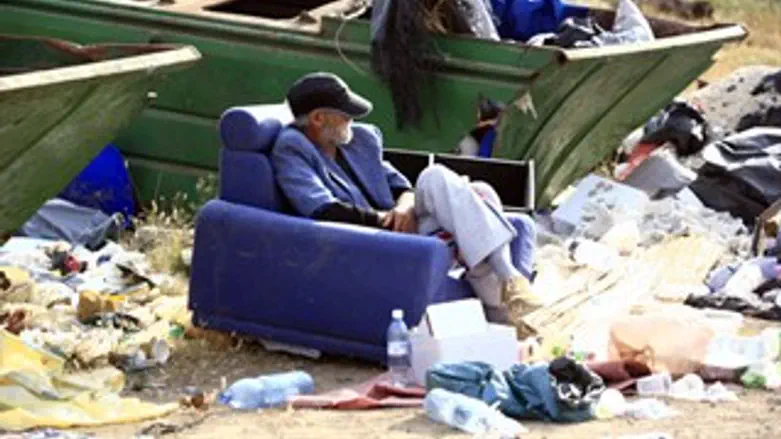
Sanitation services in Beirut have been at a standstill for several weeks due to labor disputes and endless arguments about the proposed location of garbage dumps. No one in the city will agree to having a dump in his backyard and for that matter, anywhere in his neighborhood. Thousands of tons of smelly trash are piled up in the city, and the hot weather that has hit the area over the last few weeks has made them even more unbearable than usual. A joke going around Beirut says that the price of clothespins is rising, as people have been buying them to stop up their noses.
The trash problem is also the result of a non-functioning officialdom. The government of Tamam Salam does not seem to be able to make any decisions, the parliament has not been able to appoint a president for over a year, and even the parliamentary elections have been put off in the legal vacuum that prevails. Lebanon is barely functioning, its citizens have no recourse. Their protest against the sanitation removal situation is really a protest against their dysfunctional state.
Add to that the population's furor at the rampant corruption in government corridors that has been going on for years, but it is clear that the main problem paralyzing Lebanon's government is that one basic truth lies behind everything that happens in the country: the fact that nothing, absolutely nothing, can happen in Lebanon without Hezbollah's sanctioning it. That terror organization has turned into the largest, most organized and most influential entity in the country. It would not be an exaggeration to call it a "state within a state". Hezbollah has significant economic power, including many public companies that deal with infrastructure, such as roads, bridges, construction, communications, water and electricity.
And Hezbollah is not alone. Iran stands right behind it. Opposing it are the Christians, Sunnis, Druze and some Shiites who are against Hezbollah's role in Lebanon, backed by Saudi Arabia. The growing tension between Iran and the Saudis over the nuclear agreement with international powers has spilled over into Lebanon, causing the rival groups to widen the chasm between them. Everyone knows how the billions of dollars that Hezbollah will probably receive from Iran as a result of the agreement will be spent. The terror group will be able to buy politicians, media personalities and the media itself, in addition to arms and weapons, making their control over all of Lebanon just a question of time.
The large demonstrations in Beirut that erupted last week are a reflection of the situation. The army – that obeys Hezbollah's orders – killed four protestors and wounded scores of them. The army surrounded the government's offices with a concrete wall in order to protect the buildings, but the citizenry used the new barrier to post their protests.
Among the graffiti on the wall were some that are particularly interesting: "Our thanks to the government for providing us with the paper to voice our protests"; "There are monsters on the other side of this wall"; "The Class-Separation Wall"; "The Wall of Shame"; "The Wall of Oppression"; "I prefer to live on the border with Israel"; "You stink"'; "The Theft Authority Pimps"' (= a takeoff on the expression in Arabic for "Ministerial Council meetings)". In fact, Facebook has a new Lebanese account named "You stink."
On one of the news websites a Lebanese citizen wrote: "Demonstrators must break into Dahiya (the southern suburb of Beirut, a Hezbollah stronghold), the shameful Shiite suburb, filled with those who collaborate with Iran and Russia - and behead the snake." The reference is clearly to Hassan Nasrallah, who involved Lebanon in the Syrian conflict, which many, including Shiites, consider an unnecessary war. Nasrallah is careful to repeat that "we are in the place we are supposed to be" meaning the battlefields of Syria. A Lebanese took this mantra and drew it on a trashcan with Nasrallah in its center.
The one feeling shared by all the different ethnic groups in Lebanon is the sad realization that the Syrian conflict is going to reach them in the near future. There are constant clashes in the northern city of Tripoli between the Sunni neighborhood Bab al-Tabbaneh that backs the Syrian rebels and the Alawite neighborhood Jabal Mohsen that backs Assad. This has been going on since 2011 and scores of people have been killed in these clashes.
In Ain El-Helweh, the southern Lebanese Palestinian refugee camp near Sidon, Fatah militants are battling the Islamic group Jund al-Sham over the demands of the Islamists to allow them to draft residents to aid the rebels in Syria. Fatah is opposed to that for fear that Hezbollah will take revenge on the Palestinian Arabs in Lebanon it they join the rebels, the way Assad did to the Palestinians in the Yarmouk camp who did not help him fight the rebels.
The tensions among the Palestinian factions raise tensions in other refugee camps in Lebanon. The fear is that other camps will find themselves embattled soon enough.
Lebanon is on the brink of an abyss where every unusual event can ignite a civil war worse than the one that took place from 1975 to 1989. Israel, Europe and the rest of the world must be prepared for this eventuality, because the flood of refugees from Lebanon will rival that of Syria, while the Syrian atrocities may repeat themselves in that hapless country.
Written for Arutz Sheva in Hebrew, translated by Rochel Sylvetsky